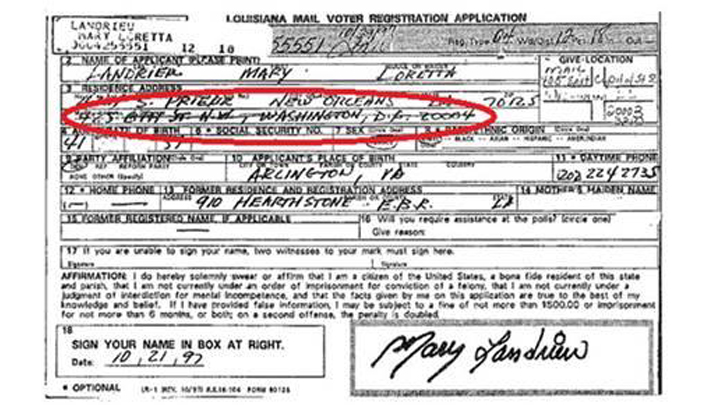Author: liz
-

Legislature Says NO to Raising Taxes in New Orleans
By Louis R. Avallone
–
Should Caddo/Bossier Follow Suit?It’s a popular business adage that you have to spend money to make money. The question for taxpayers on November 4 is how much money, and whose money are you spending?
You see, there’s an initiative on the ballot in November that will increase the sales tax on hotel guests in Caddo/Bossier by 2%, making the total occupancy tax 6.5% (and among the highest in the state). If passed, this means for every $100 in hotel bills, paid by guests to our area, $6.50 will be collected from them in taxes.
The added 2% will generate an estimated $3 million in dedicated revenue for the Independence Bowl Foundation, as well as the Shreveport-Bossier Sports Commission and the Ark-La-Tex Regional Air Service Alliance. These organizations are composed of hundreds of volunteers and supporters who give their time, and considerable talent, to promote our communities, and improve our quality of life, not only for today, but as a legacy for the next generation.
They are a big reason that the Independence Bowl is the largest sporting event in the state of Louisiana outside of New Orleans and LSU home football games. And that it’s the 11th oldest bowl in our country, and that it is being televised for the 23rd year in a row on ESPN. So, with their share of the almost $1 million in recurring annual revenue expected from the proposed tax, the Independence Bowl Foundation says that it can attract even better teams to the bowl, and preserve the bowl for years and years to come.
Indeed, the Independence Bowl has pioneered sports tourism for our region, opening the doors to events like the Bassmaster Classic last year – which generated an estimated $7 million for the local economy. The Shreveport-Bossier Sports Commission says it can attract even more of these quality sporting events with its $750,000 share in taxes that it is expected to receive each year, if voters say “yes” next month.
And, of course, if you are going to invite folks from all over the country for such events, you surely have to make an easy path for them to get here. But with our region’s current air service, that’s not always convenient, or affordable. Maybe that is why over 50% of all travelers flying from the Ark-La-Tex do so from anywhere else but Shreveport Regional. This is why the non-profit organization, Ark-La-Tex Regional Air Service Alliance, says it needs their expected $1 million share of the annual revenue provided by the proposed tax. They say that if they could get just one (1) new route, with a 50-seat regional airliner, it could make as much as a $4 million impact each year.
Yes, objectives of these organizations are honorable, no doubt, and deserve our support and attention. We have to be careful, though, when folks start saying that such support, through an additional 2% hotel tax, will be at “no cost to the citizens of Caddo and Bossier parishes” or that it will be paid entirely by “out-of-town visitors”.
That’s just not necessarily true – it affects our entire economy. In fact, for this very reason, Louisiana legislators just recently voted down Mayor Mitch Landrieu’s efforts to raise the New Orleans’ hotel-motel occupancy tax by another 1.75%. If they had raised the tax, New Orleans would have been on the same level as New York City, which has the highest hotel-motel taxes in the country. And according to Lieutenant Governor Jay Dardenne, he says doing that would have made it difficult to position ourselves as a “destination”, or even to attract events like the Superbowl, back to Louisiana.
The proposed tax in Caddo/Bossier could mean that folks will stay fewer nights in our community, or hoteliers will offer less services, in an effort to compete with hotels in surrounding parishes, where the taxes are lower. After all, taxes can literally “move” people.
Consider the meteoric population growth of Bossier Parish, and the stagnating population growth in Caddo Parish, over the past 20 years. Is it just a coincidence that Caddo Parish also has the highest property taxes in the state? Probably not. Or look at the number folks migrating from Louisiana to states with no state income taxes whatsoever. Again, coincidence? Probably not.
You see, supporting this tax increase in November may be worthy of voter support, but it should never be because we can persuade enough people that “somebody else will pay the bill”.
After all, we cannot tax ourselves into prosperity. If we could, we would have reduced the nation’s unemployment rate, paid down the federal debt, decreased the poverty rate, lowered healthcare costs, and increased national security at our borders years and years (and billions of wasted tax dollars) ago.
No, we have to be careful here, on this slippery slope of increasing taxes in our community, whether it’s an occupancy tax or any other, for that matter.
As we go to the polls in November, we need to remember, as Ronald Reagan said, that we have some people around here “who have never met a tax they didn’t hike”.
And to those folks, I’d just say, remember whose money you’re spending – and that folks vote with their feet too.
-

Mary, why don you ak right?
By Louis Avallone
–
Senator Mary Landrieu is reimbursing taxpayers several thousands of dollars that she took and spent for a charter flight to attend campaign events, including a fundraiser in Dallas. She has an estimated net worth between $894,018 and $2.6 million, with assets totaling $1.9 million to $3.1 million, according to her own disclosure forms, yet she doesn’t maintain as much as an apartment in this great state of Louisiana.She represents the Louisiana people in Congress, but no longer finds it necessary to live here herself – even her voter registration card lists her primary residence as Washington, D.C. Maybe it’s because, as she said in a recent interview, “I really can appreciate the life that we live on the Hill.”
And she’s done a lot living on the Hill, indeed, with the citizens of Washington, D.C. She sponsored a bill allocating $2 million for District of Columbia schools, which are ranked 26th in the nation, while schools in Louisiana still remain ranked near the bottom – 49th in the nation. She’s an advocate for the District of Columbia, as she said in a speech recently, and she wants “to speak on their behalf”. No doubt this is why the mayor of Washington, D.C. has proudly called Landrieu “the Senator representing the District of Columbia until we become the 51st state of the United States.”
Goodness gracious, Mary. What’s wrong with you? Or as our south Louisiana family might say, “Mary, why don you ak right?”
The truth is that these Mary shenanigans represent the last vestiges of Louisiana populist politics that asks the question first (and last), “What’s in for me?”
There’s lots of examples of this in our state’s history. Governor Huey P. Long, even while wildly protesting against the wealthy in the 1930s, and proposing to guarantee every family a basic annual income, was himself making plans to become that which he so publicly abhorred – being wealthy. As a result of Long’s allegedly questionable acquisition of mineral rights to state owned properties, concentrated in wetland areas along our coast, those mineral rights have generated nearly $1 billion in royalties for his family and associates – and continue to do so still today.
Then there was Governor Edwin Edwards. He was a populist, and was elected 4 times as governor because of it. In the end, though, he was found guilty of racketeering charges and sentenced to ten years in prison. In that case, Edwards had asked the question, “What’s in it for me?” and received $845,000 from a contractor who wanted to do business with the state, while at the same time raising taxes on the people of Louisiana by almost $1 billion.
Then there was populist U.S. Representative Bill Jefferson from New Orleans, who rose from poverty to then serve in Congress. He accepted $500,000 in bribes while in office, in exchange for his influence in Congress. He hid some of that money in his freezer, as you may recall, but was sentenced to 13 years in prison after everything had thawed out.
Then there was New Orleans Mayor Ray Nagin who recently was convicted on 20 of 21 counts of bribery, and is now serving 10 years in prison. Prosecutors explained that Nagin sold the mayor’s office, for personal gain, which included lavish trips and cash, even after Katrina, where he had ignored federal and state offers of help, and their recommendations to evacuate the city before the storm.
All of these examples share a common denominator: These politicians all claimed to be champions of the people, and defender of the “little guy”. Instead, the people lived under one set of rules, while their elected leaders lived by another. They said one thing, and then did another.
They may have had good intentions, but one only needs to look around to see what decades of politicians’ good intentions have done to our nation, and our communities. Intentions are powerful beginnings. They provide a spark to ignite a purpose, launch a plan, and to direct the mind, but they tell you nothing about the actual outcome.
Huey Long made famous the slogan, “Every man a king, but no one wears a crown.” Sounds good, but history has shown it’s often the politicians who end up wearing the crowns. All politicians, to some degree, sound alike – and it’s becoming harder and harder to tell the difference.
But at least they ought to live in the state that they are representing, so we can keep an eye on them, and figure it out for ourselves.
Robert Frost wrote famously in a poem about how two roads diverged in the woods, and how he chose the one less traveled, and how “that has made all the difference”. For our state’s elected officials in Washington, shouldn’t they choose the road back home, as well?